 Petzlover
Petzlover Bavarian Mountain Hound is originated from Germany but Muggin is originated from United States. Bavarian Mountain Hound may grow 38 cm / 15 inches higher than Muggin. Both Bavarian Mountain Hound and Muggin are having almost same weight. Both Bavarian Mountain Hound and Muggin has almost same life span. Both Bavarian Mountain Hound and Muggin has almost same litter size. Bavarian Mountain Hound requires Moderate Maintenance. But Muggin requires High Maintenance
Bavarian Mountain Hound is originated from Germany but Muggin is originated from United States. Bavarian Mountain Hound may grow 38 cm / 15 inches higher than Muggin. Both Bavarian Mountain Hound and Muggin are having almost same weight. Both Bavarian Mountain Hound and Muggin has almost same life span. Both Bavarian Mountain Hound and Muggin has almost same litter size. Bavarian Mountain Hound requires Moderate Maintenance. But Muggin requires High Maintenance
 The Bavarian Mountain Hound was originally bred mixing the Bavarian Hound and the Hanover Hound. They decided to mix these breeds in a hope that the new breed will have the best of the parents. Actually, it turned out better than they could even imagine, since they created a great family dog, with magnificent stamina, quiet temperament and supersensitive nose that made them great hunters.
The Bavarian Mountain Hound was originally bred mixing the Bavarian Hound and the Hanover Hound. They decided to mix these breeds in a hope that the new breed will have the best of the parents. Actually, it turned out better than they could even imagine, since they created a great family dog, with magnificent stamina, quiet temperament and supersensitive nose that made them great hunters.
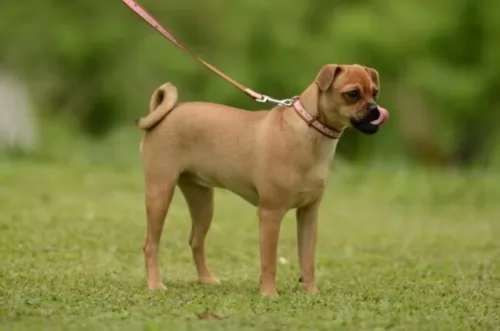 The Muggin is not a purebred dog but rather a cross breed. The hybrid dog population has exploding in the United States in the past ten to fifteen years. A lot of the success of crossbreeding can be attributed to the marketing of these dogs as “Designer Breeds”.
The Muggin is not a purebred dog but rather a cross breed. The hybrid dog population has exploding in the United States in the past ten to fifteen years. A lot of the success of crossbreeding can be attributed to the marketing of these dogs as “Designer Breeds”.
Designer breeds are developed because someone wants some of the characteristics of Breed X and some of the characteristics of Breed Y. Therefore, Designer breed XY is developed. In order to understand this hybrid dog, you need to understand the two purebred breeds they come from. The Muggin is the result of crossing the purebred Pug and the purebred Miniature Pinscher or Min Pin. So, we need to look at the origins of these two purebred breeds.
They are also referred to as Pin Pugs, Min Pin Pug, Pug Pin, Pugscher and were originally the Carlin Pinscher. However, these days there are other breeds besides the Pug and Min Pin making up the gene pool for the Carlin Pinscher. Because of this the Muggin has been separated from the Carlin Pinscher. The American Canine Hybrid Club has accepted the Muggin name for the Pug Min Pin cross.
Pugs are originally a Chinese breed and they were companions rather than working dogs of any kind. During the Han Dynasty they were the dogs of royalty. At the same time there were dogs very much like the pug in Japan and Tibet. The Pugs came to Europe by way of trades with the Dutch who then brought them to Europe. They were named the Mopshond and they caught the eye of the royalty in Europe as well.
Pugs were imported to the United States after the U.S. Civil War and in 1885 they were recognized by the American Kennel Club and called Pugs.
The Min Pin traces its origins to Germany a few hundred years ago. They were “ratters”, guarding the house and stables from all types of vermin. Most dog people believe that the Min Pin is much older than this, perhaps by thousands of years. Yet there is no detailed history to support that. Most believe the breed comes from the German Pinscher line. There might also be some Daschund and Greyhound in that line.
They were once called the Reh Pinscher. This was their name when they came to North America in 1919 and then the breed was renamed in 1972. The Miniature Pinscher Club of America was started in the early 1900’s while the AKC recognized the Min Pin in 1929. Today the Miniature Pinscher is a family dog, a companion.
The Muggin is a loving and loyal dog. All they want is for you to be happy and to share that happiness with them. They can also easily become a one person dog and bond intensely with that one person. They are not a hybrid that you can leave home alone while you go to work for 8 to 10 hours a day. No, the Muggin needs attention and lots of it. Despite this they are great with both kids and other dogs.
Because they are a cross breed, they are not recognized by the American Kennel Club. However, some hybrid registries do recognize the Muggin. These include the Designer Breed Registry, the International Designer Canine Registry, The Designer Dogs Kennel Club, the American Canine Hybrid Club, and the Dog Registry of America.
 The Bavarian Mountain Hound is a medium sized breed of a dog. They have larger bones, but there is a very low risk of obesity. This is a very active dog, with a very muscular body. Their bone structure defines in a wide chest, and their back legs set a little bit higher than the front legs. They have strong necks and pear-shaped heads. They have strong jaws, ideal for a hunting dog. They are very specific because of their big brown eyes. The Bavarian Mountain Hound is a perfect pet. First of all, he is not a pack dog. He gets attached to his family and he is not very friendly with strangers. If they are trained well, they will never attack a stranger but they will bark and let you know that something isn’t right.
The Bavarian Mountain Hound is a medium sized breed of a dog. They have larger bones, but there is a very low risk of obesity. This is a very active dog, with a very muscular body. Their bone structure defines in a wide chest, and their back legs set a little bit higher than the front legs. They have strong necks and pear-shaped heads. They have strong jaws, ideal for a hunting dog. They are very specific because of their big brown eyes. The Bavarian Mountain Hound is a perfect pet. First of all, he is not a pack dog. He gets attached to his family and he is not very friendly with strangers. If they are trained well, they will never attack a stranger but they will bark and let you know that something isn’t right.
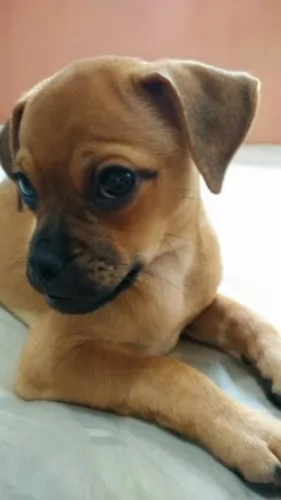 As previously mentioned, the Muggin is a cross between the Pug and the Miniature Pinscher. They are small, shave sturdy legs, floppy ears, and a wrinkled forehead for the most part. Like all hybrids however, all first generation dogs do not look the same. Some might resemble the Min Pin more and others the Pug. Some might have the stockier body of the Pug and the short tail of the Min Pin. Or one could have the Pug’s curly tail and the athletic body of the Min Pin. The snout can be short or long, the ears heavy and floppy or small and thin.
As previously mentioned, the Muggin is a cross between the Pug and the Miniature Pinscher. They are small, shave sturdy legs, floppy ears, and a wrinkled forehead for the most part. Like all hybrids however, all first generation dogs do not look the same. Some might resemble the Min Pin more and others the Pug. Some might have the stockier body of the Pug and the short tail of the Min Pin. Or one could have the Pug’s curly tail and the athletic body of the Min Pin. The snout can be short or long, the ears heavy and floppy or small and thin.
Their coats will usually be fine and short, and colors can vary a lot. They might be black and tan like a Min Pin, or more like a Pug with a solid color of cream, brown, black, white or golden. They also tend to shed quite a bit no matter which parent they take after the most. They will either have brown noses and black eyes or brown eyes and black noses or any combination of black and brown.
If Muggins are only bred to Muggins the second and third generations will resemble each other more than the first generations will. However, at this point many breeders will try to strengthen the breed by occasionally adding in to the gene pool other dog breeds.
 Special talents: Since the Bavarian Mountain Hound is born with a strong scent, they are great for hunting. They can be trained to be search dogs.
Special talents: Since the Bavarian Mountain Hound is born with a strong scent, they are great for hunting. They can be trained to be search dogs.
If you live slow and quiet life indoors, maybe the Bavarian Mountain Hound is not the best choice for you. They are a calm breed, they do not bark a lot, but they need daily outdoor activity. They usually get attached to the owner, but in case you raise this dog in a family, they will be attached to adults and the children. They are very good while playing and living with the children, but if you usually have a lot of other children or strangers in a house, he will adapt to that kind of social life very easy.
It is very important that you start an early socialization of your Bavarian Mountain Hound. In situations where you raise this breed without the social life, they will have difficulties when they find themselves in situations with other animals. If you raise this breed with other animals in the same home, they will learn to play with other dogs, cats etc.
Bavarian Mountain Hound is not easy to train because they get easy distracted with smelling something more interesting than listening to your commands. It is not advised to have this breed as your first pet because they need an experienced trainer with a lot of patience and understanding.
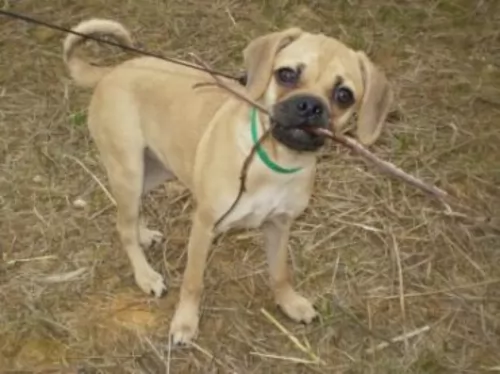 They are good with children but should be supervised.
They are good with children but should be supervised.
Energetic and loving little dogs.
Very adaptable if taken for walks or has space in a yard. Can live anywhere under those circumstances.
Very intelligent but strong willed dog. Needs strong leadership from their person.
 The Bavarian Mountain Hound is a quiet type of the dog. They don’t ask for a lot of attention and even if they develop some health issues you will have a hard time finding it out. So, the regular vet checks are a necessity. They usually suffer from an ear infection. The vet will usually check for a hip or an elbow dysplasia since those diseases occur with highly active breeds. Some irritations with eyelids are also found in the medical history of this breed but they are generally very rare.
The Bavarian Mountain Hound is a quiet type of the dog. They don’t ask for a lot of attention and even if they develop some health issues you will have a hard time finding it out. So, the regular vet checks are a necessity. They usually suffer from an ear infection. The vet will usually check for a hip or an elbow dysplasia since those diseases occur with highly active breeds. Some irritations with eyelids are also found in the medical history of this breed but they are generally very rare.
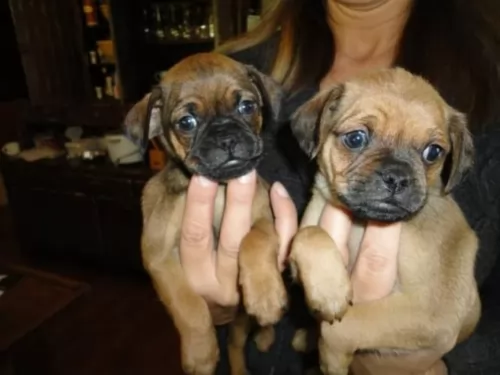 The first generation of Muggins may face all the health issues of either or both their parents, while second and third generations tend to have less health issues, They types of issues the first generation of Muggins might face include:
The first generation of Muggins may face all the health issues of either or both their parents, while second and third generations tend to have less health issues, They types of issues the first generation of Muggins might face include:
Nerve Degeneration – Degenerative Myelopathy or Dm – causes paralysis and eventually fatal.
 There is a big difference in feeding the Bavarian Mountain Hound since you can raise him to be a pet or a dog for hunting. If you decided to keep this breed as a pet, they will do just fine with one of the dry foods that are good quality. If you want to raise them as a hunting dog, an active dog, then they will need a high-quality dry food and occasionally some raw minced meat.
There is a big difference in feeding the Bavarian Mountain Hound since you can raise him to be a pet or a dog for hunting. If you decided to keep this breed as a pet, they will do just fine with one of the dry foods that are good quality. If you want to raise them as a hunting dog, an active dog, then they will need a high-quality dry food and occasionally some raw minced meat.
High-quality food for puppies with a lot of nutrients that will help in growing the healthy bones and beautiful coat.
Since they have a short coat, the Bavarian Mountain Hounds don’t need a regular or any special kind of grooming. They will do just fine with occasional brushing. They don’t shed a lot, but in a season when they do you are free to brush them more regularly. They enjoy the brushings, cuddles, scratching, belly rubs - they are very lovable breed. But, as advised, take them to regular vet check because they can be very quiet even when they feel the pain.
The Bavarian Mountain Hound has a gene of a working dog and that is the reason why they need a lot of the activity on a daily basis. No matter if you take him to walk, run or a bike ride, they will love it. They do not like being on the leash since they love to use their nose to play. If you socialise them well, the dog park will be a great thing for them.
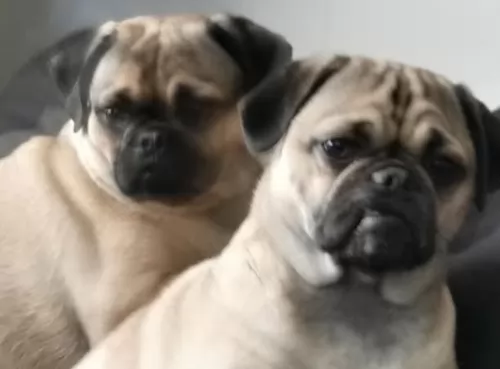 This crossbreed has a definite propensity to overeat and become obese from puppyhood. Feed the puppy a small dog dry food 3-4 times a day a total of ¾ of a cup to 1 cup.
This crossbreed has a definite propensity to overeat and become obese from puppyhood. Feed the puppy a small dog dry food 3-4 times a day a total of ¾ of a cup to 1 cup.
Again don’t over feed the adult Muggin or he will become obese easily. Feed at least twice a day one to one and half cups total.
High Energy
With the athleticism of the Min Pin taking precedence over the less active Pug, the Muggin is a fairly active dog. The Muggin is also not effective by the Pug’s difficulty with heat and cold. They love to go on long walks and need exercise to keep from being bored and destructive. However, remember there is a Pug in your Muggin and if she is not into exercise don’t try to get her to do more than she can.
You do want your Muggin to get enough exercise to fend off any tendency to be overweight. They are good at agility, jogging, obedience and watchdog activities.